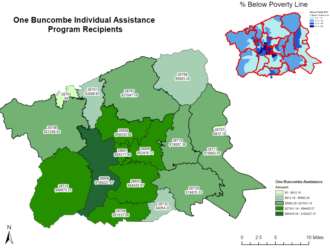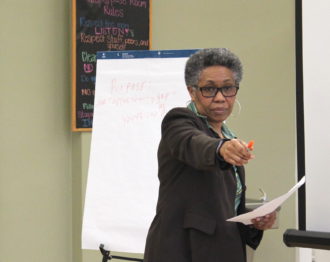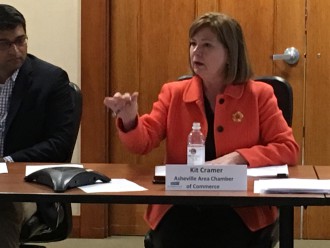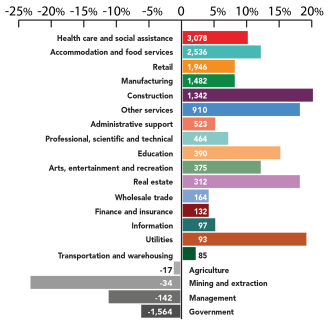Opponents say downtown plan will further marginalize the unhoused population and duplicate services city should be providing.


Opponents say downtown plan will further marginalize the unhoused population and duplicate services city should be providing.

When Kit Cramer arrived at the Asheville Area Chamber of Commerce as president and CEO in 2010, Asheville’s downtown was the subject of much complaining about panhandling, trash and graffiti.
Fourteen years later, Asheville’s downtown is the subject of much complaining about panhandling, trash and graffiti. And the community is once again considering a BID.

Buncombe County’s Comprehensive Plan 2043, the draft of which was released in December, is now in the fourth and last phase of its development. County officials are seeking a final round of input from the community before the plan’s approval by the Planning Board and Board of Commissioners, currently slated for May.

The local business group’s annual event usually features WNC’s General Assembly delegation and its reflections on happenings in Raleigh. This year, the entirety of Buncombe County’s incoming state House contingent was absent: As newly elected officials, Eric Ager, Lindsey Prather and Caleb Rudow were taking part in orientation at the capitol.

“An increase in the subsidy rate formula will allow more centers to continue operating and to increase pay for the child care workforce.”

While much attention has been paid to the struggles of individual businesses that have borne the economic brunt of the pandemic, Asheville’s business organizations, which provide a critical framework for entrepreneurs to network, collaborate and market their wares, have also taken a hit.

Nearly 1,050 households have received over $453,000 in emergency assistance from the fund for necessities such as housing, utilities and transportation. And roughly $853,000 has been loaned to 92 area businesses to help them weather the coronavirus’s economic impacts, contributing to the retention of 674 jobs.

For some store owners, the highly anticipated May 9 move of North Carolina into Phase 1 of reopening was a signal that an end to their financial woes might be in sight. Others felt the move came too soon and remained closed to protect the safety of their staff and customers.

At a March 27 press conference, Gov. Roy Cooper announced a stay-at-home order, effective throughout North Carolina at 5 p.m. Monday, March 30, that will stay in effect until Wednesday, April 29 — nearly three weeks longer than the duration of Buncombe County’s recently enacted mandate.

The Tourism Development Authority discusses the proposed hotel moratorium during a July 31 board meeting.

A group representing government, education, business and nonprofit organizations is coalescing to form a community response to a severe racial achievement gap in Asheville City Schools. But it’s not yet clear how the initiative will define its goals and approach — and what resources it can attract to fund the effort.

Asheville Area Chamber of Commerce President & CEO Kit Cramer weighed in on the year’s top economic development accomplishments in Buncombe County, starting with funding progress on the Interstate 26 Connector.

In a process not open to the public, Council has selected a committee of “key community leaders” to help review candidates for the most powerful unelected official in city government. City spokesperson Polly McDaniel said the panel will provide “input and perspective on a list of candidates,” adding that members “will serve in an advisory role.”

Positive economic news keeps coming, with Buncombe County boasting the state’s lowest unemployment rate for 38 consecutive months, and numbers showing strong growth in most sectors of the local economy.

In an arrangement that Chamber leaders said was the first of its kind for the region, the Asheville Area Chamber of Commerce Board of Directors on Oct. 31 unanimously approved plans to provide economic development services for the Haywood County Chamber on a consulting basis.

Women in Asheville have seen the light when it comes to the benefits of networking to boost their business and personal connections. Xpress explored a variety of networking opportunities for women, as well as some high-powered advice for maximizing the impact of time spent networking.

Asheville’s bustling economy owes much to the city’s continued popularity as a tourist destination, but the area is also benefiting from a wave of local business expansions.

An diverse and influential group looks to incrementally implement universal preschool in Buncombe County. Xpress takes an in-depth look at the organization, logistics and potential costs behind the effort.

At the Asheville Area Chamber of Commerce’s Annual Meeting on June 30, area business folk mingled, munched and meditated as they considered the state of the local business community. Awards were given and a keynote address was heard. The Omni Grove Park Inn deftly managed the sold-out crowd, though filled parking decks presented some attendees with an opportunity for a brisk walk from surface lots to the ballroom.

A-B Tech administrators, teachers and students joined with community leaders Sept. 12 to launch “Jobs for the Future,” a campaign on behalf of a 0.25 percent sales-tax increase to fund capital improvements at the school. Photos by Jerry Nelson

Kit Cramer came on board as the Asheville Area Chamber of Commerce’s president and CEO last fall. Xpress sat down with her recently, along with Ben Teague, the Chamber’s senior vice president for economic development.